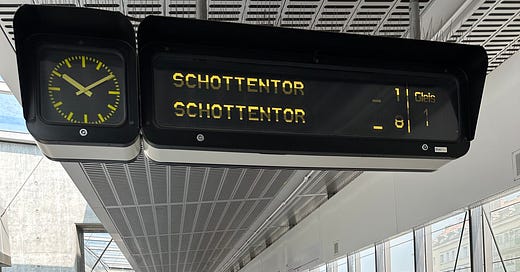Vienna and New York: High- and Low-Trust Cities
Implications of the two cities' transit systems.
Before I set off for my adventures in Vienna, I had to get from the (nice) outskirts of town to the city center. To do so, I purchased a day-pass at the Krieau station that entitled me—if I got this wrong and you’re a Viennese transit official reading this: I’m sorry!—to ride the subway, buses, and trolleys (they have those here) for 24 hours.
Upon entering the station with my ticket, I noticed two things: first, there was no turnstile, gate, or other impediment to pass through by way of my ticket; second, there was no ticket-taker to acknowledge my possession thereof to wave me ahead. In fact, after an entire day of gallivanting about the city using its public transportation system, I was never once stopped to ask to show my ticket. Regardless, I made sure to “validate” my ticket by sticking it in these little automated doodad in each terminal.
Theoretically, there must be a nonzero chance that some official will walk through, ask to see one’s (validated) ticket, and levy a fine on those without the appropriate ticket. If so such chance existed, people would realize the lack of a cost from cheating in the repeated game of paying-for-Viennese-public-transit and free-riding would become the dominant strategy.
Right?
Well, that the prediction game theory offers us. But perhaps there are other factors at play that I have neglected to take into account.
I think that there are few transit officials checking commuters’ tickets for the same reason that Vienna opted for turnstile-less subway platforms, the streets are impeccably clean, and there are incredibly few homeless people: Vienna is a well functioning high-trust society. Exhibit A: Vienna’s transit system has a mere 2% fare evasion rate in 2020, meanwhile New York City’s MTA hemorrhaged $690 million to fare evasion in 2022. For whatever reason(s), and I haven’t the foggiest as to what these might be, Vienna is a high-trust society and New York is not.
The constellation of factors that contribute to the glaring differences between New York and Vienna is certainly complex, subtle, and nuanced. But I want New York to be as clean, safe, and efficient as Vienna. So, some team of economists and sociologists, please go figure this one out.





An interesting fact about Vienna is that it has an incredibly effective public housing system. about half of the housing units are controlled (directly or indirectly) by the state! a consequence is that there is significantly less homelessness and a lower rate of extreme poverty. Nobody in Vienna pays any more than 25 percent of their income on rent, compared with the benchmark of 30% in the US. I have a feeling that the collectivist, communist, leftist ethos has something to do with the low evasion rate. Plus higher faith in the state and so on and whatever. Communism is bad, but Vienna taking care of its poor and vulnerable citizens is probably good